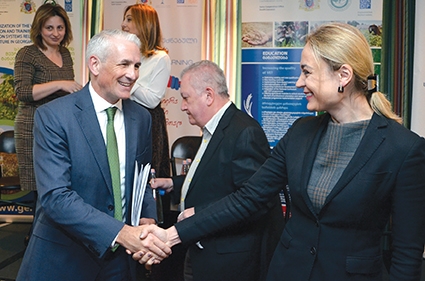‘New Skills for Agriculture’ Conference Promotes Vocational Education
On November 22, the “New Skills for Agriculture” conference brought together representatives of the Georgian government, businesses, civil society, farmers associations and educational institutions, to discuss the new trends in vocational education and training, including Work-based Learning and university minor programs for vocational trainers, while also focusing on the prospects and challenges of vocational education and training in agriculture. The conference was a part of the EU Vocational Skills Week 2017 which was held between November 20 and 24 across different European and EU neighborhood countries under the slogan “Raising VET attractiveness & excellence”.
Ketevan Natriashvili, First Deputy Minister of Education and Science of Georgia, and Shombi Sharp, Deputy Head of UNDP in Georgia opened the event.
“I’d like to thank involved all partners for making this program a possibility,” Natriashvili said. “I think it’s extremely relevant and pertinent that we are having this discussion today as part of the broader EU Vocational Skills Week 2017. The EU is of course also a very important player in promoting and modernizing vocational training here in Georgia, and I think that this fits very well with Georgia’s broader European path. Georgia is already a well-known leader in the region for many reforms, in governance, public services, anti-corruption, so now strong reform in the education and agriculture sector, centered around vocational training, is perfectly within that already developed identity,” she concluded.
“The challenges are clear and very significant: Georgia is facing a 12% national unemployment average, 30% unemployment among youth, and hidden unemployment in agriculture,” Sharp added. “Vocational education and training is one of the most effective ways to address these issues and create more jobs and learning opportunities, in rural areas especially. Indeed, we are fortunate to be able to learn from the European and Swiss experiences on how to best address these challenges. This begins with making the profession of being a vocational trainer an exciting and fulfilling prospect, and bringing the most modern and exciting curriculums and technologies into the process and creating vocational training as an exciting first choice for young students as a career path. At the end of the day, it’s all about getting a job and creating employment, so bringing employers, the private sector, businesses, into the fold is crucial, while new approaches to work-based learning and life-long learning are also very exciting developments. As an example from the latest private project from the Georgian Farmers Association, we have 40 students who have been placed across four different regions in Georgia getting real-life experience as part of their vocational training. So, if anyone asks, ‘how can we make vocational training more attractive?’ I always tell them to go and speak and speak to those 40 students. Nobody has to tell them that they have made the right choice,” the UNDP Deputy Head concluded.
The event was organized by the Ministry of Education and Science and the Ministry of Agriculture, with support from the United Nations Development Program (UNDP) and Swiss Agency for Development and Cooperation (SDC), in partnership with the National Center of Education Quality Development, Georgian Farmers’ Association and other partners.
Mate Foldi











